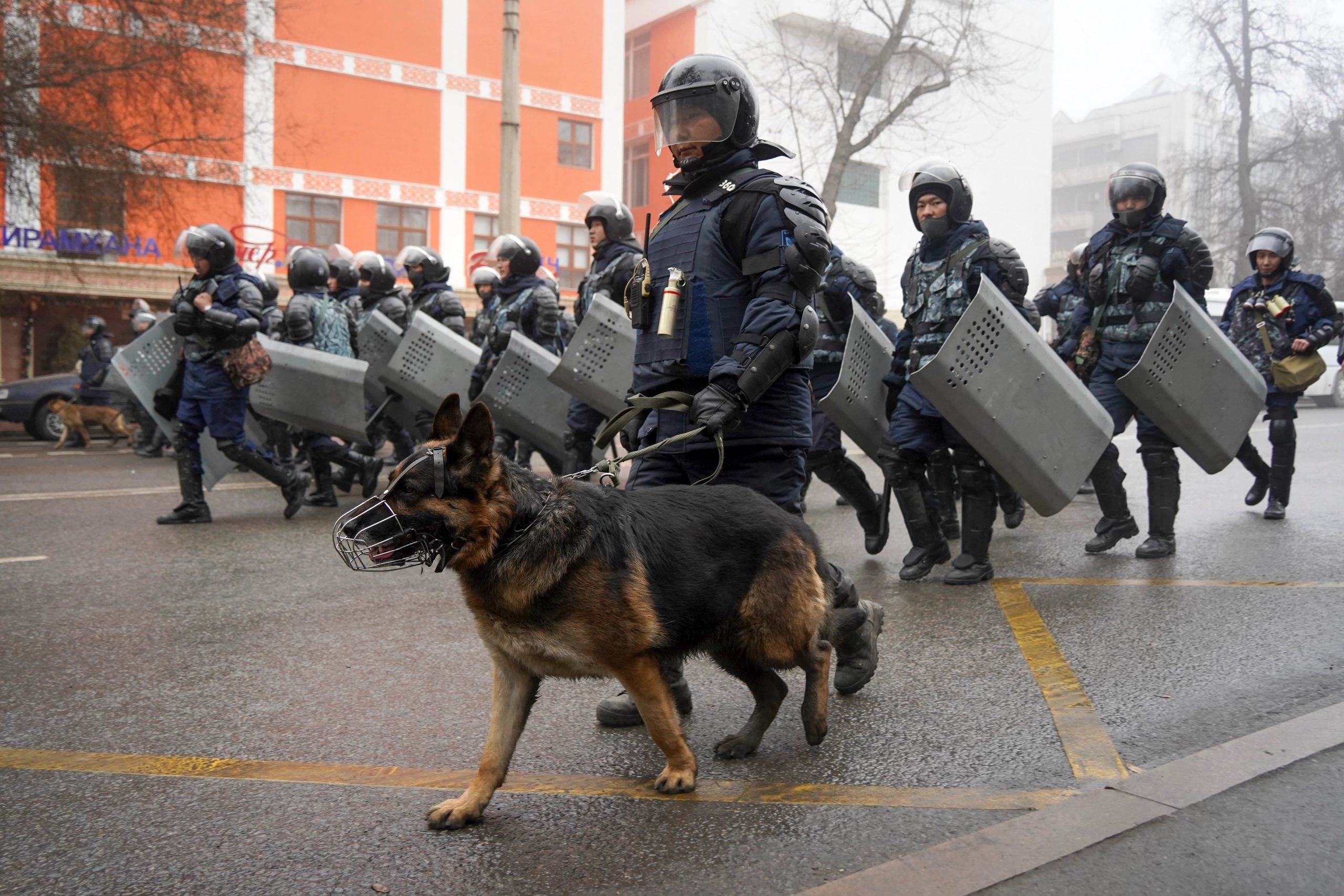Kazakhstan: 'Critical red' level of terrorist threat, order restored
As violence escalates in Kazahstan, and after state apparatuses found beheaded police officers in the country in light of riots, Kazakhstan ups its level of terrorist threat.
-

Riot police in Kazakhstan
Kazakhstan on Friday imposed a countrywide "critical red" level of terrorist threat, local news outlets reported, meaning the government sees that the terrorism threat is severe in the country.
The severity of the threat means the government is fully mobilizing all its forces and special forces, who, in turn, will be able to search civilians and vehicles at will, in addition to restricting and directing their movement and accessing information transmitted via various telecommunication channels.
Terrorist acts
The governmental action comes in light of terrorist attacks and operations in Kazakhstan, which have killed 13 law enforcement officers and wounded 353 others.
The bodies of two slain police officers were discovered beheaded, indicating the terrorist intention behind the militant armed groups in Almaty.
Rioters stormed several governmental buildings in the west of the country, including the Almaty mayor's office, destroyed and vandalized storefronts, and set fire to vehicles throughout the city.
The countrywide turmoil also saw armed groups blocking entry and exit to medical staff and patients to at least two hospitals in Almaty, Kazakhstan's largest city.
'Order mostly restored'
After days of unprecedented violence and unrest, President Tokayev said Friday that order had mostly been restored in the country.
"Law enforcement forces are working hard. The constitutional order has been mainly restored in all regions," the president clarified.
He also explained that security operations would continue "until the total destruction of the militants."
In conjunction, the Kazakhstani ministry of interior said 26 "armed criminals" had been killed and 18 others had been wounded.
In a statement, the ministry asserted that all of Kazakhstan's regions had been "freed and taken under increased protection," explaining that some 70 checkpoints had been set up around the country.
Riot-turned-demonstrations
The riots started in the country on Tuesday night when several thousand demonstrators took to the street to protest against the surging gas prices in Kazakhstan.
Following the thousand-strong demonstrations, Kazakhstani President Kassym-Jomart Tokayev declared a state of emergency in the west of the country and Almaty.
President Tokayev dismissed the government the morning of the demonstrations in a bid to simmer down the situation. However, confrontations between law enforcement and demonstrators resumed in Almaty on Wednesday, Al Mayadeen's Bureau Chief in Moscow reported.
Peace-making attempts from the authorities
Tokayev had previously called for peace in a Facebook video he made in response to the demonstrations. "The government will not be felled, but we don't need conflict," he said.
Before its dismissal, the government made an initiative to lower LPG (liquid petroleum gas) prices, but that failed in calming protests.
Just two days after the demonstrations started, the government set a six-month fuel price cap. "The government took urgent measures to stabilize the socio-economic situation," Kazakhstan's government said in a statement.
It announced a 180-day freeze on price increases for LPG, gasoline, diesel fuel, and utilities in several cities and provinces.
The government also temporarily restricted the export of foods including beef, lamb, potatoes, and carrots "to stabilize prices for socially significant food products."
'Foreign-trained terrorists'
As the intensity and violence of demonstrations escalated, President Tokayev appealed to the Collective Security Treaty Organization (CSTO) for help in quelling protests across the country that he said were led by "terrorist gangs".
"Today I appealed to the heads of CSTO (Collective Security Treaty Organization) states to assist Kazakhstan in overcoming this terrorist threat," Tokayev said on state television early Thursday.
According to the president, accused the attacked of receiving training abroad and being foreign agents.

 4 Min Read
4 Min Read










